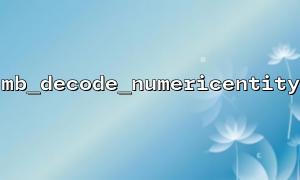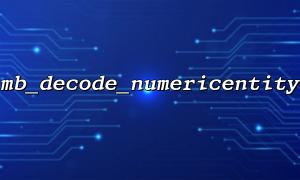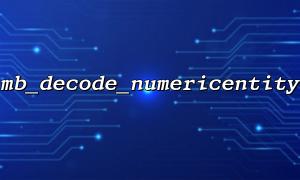[Can mb_decode_numericentity Be Used Together with htmlspecialchars? Practical Examples]
In PHP development, mb_decode_numericentity and htmlspecialchars are commonly used string processing functions. mb_decode_numericentity is used to decode character entities into their corresponding Unicode characters, while htmlspecialchars escapes special HTML characters (such as <, >, &, ', ", etc.). These two functions can sometimes be used together, especially when handling user input or generating safe HTML content.
The mb_decode_numericentity function converts a string containing numeric entities (such as ሴ or Ӓ) into the corresponding Unicode characters. It is part of the multibyte string library (mbstring), making it especially useful for handling strings with non-ASCII characters, such as Chinese or Japanese.
Usage example:
<span><span><span class="hljs-variable">$input</span></span><span> = </span><span><span class="hljs-string">"&#x4e2d;&#x56fd;"</span></span><span>; </span><span><span class="hljs-comment">// Represents the Unicode numeric entities for “中” and “国”</span></span><span>
</span><span><span class="hljs-variable">$output</span></span><span> = </span><span><span class="hljs-title function_ invoke__">mb_decode_numericentity</span></span><span>(</span><span><span class="hljs-variable">$input</span></span><span>, [</span><span><span class="hljs-number">0x0</span></span><span>, </span><span><span class="hljs-number">0x10FFFF</span></span><span>, </span><span><span class="hljs-number">0</span></span><span>, </span><span><span class="hljs-number">0xFFFF</span></span><span>], </span><span><span class="hljs-string">'UTF-8'</span></span><span>);
</span><span><span class="hljs-keyword">echo</span></span><span> </span><span><span class="hljs-variable">$output</span></span><span>; </span><span><span class="hljs-comment">// Outputs: 中国</span></span><span>
</span></span>htmlspecialchars is used to convert special characters in HTML into their corresponding HTML entities, preventing malicious code injection and ensuring safe display of content. It is commonly used to process data before outputting to the browser to avoid XSS attacks.
Usage example:
<span><span><span class="hljs-variable">$input</span></span><span> = </span><span><span class="hljs-string">'<div class="test">Hello, World!</div>'</span></span><span>;
</span><span><span class="hljs-variable">$output</span></span><span> = </span><span><span class="hljs-title function_ invoke__">htmlspecialchars</span></span><span>(</span><span><span class="hljs-variable">$input</span></span><span>, ENT_QUOTES, </span><span><span class="hljs-string">'UTF-8'</span></span><span>);
</span><span><span class="hljs-keyword">echo</span></span><span> </span><span><span class="hljs-variable">$output</span></span><span>; </span><span><span class="hljs-comment">// Outputs: &lt;div class=&quot;test&quot;&gt;Hello, World!&lt;/div&gt;</span></span><span>
</span></span>Although mb_decode_numericentity and htmlspecialchars serve different purposes, they may be used together in some situations. For example, when processing user input that contains HTML entities or Unicode numeric entities, you might need to decode those entities first and then escape the string to ensure page safety.
Suppose a user submits text with numeric entities that may include some HTML tags or other special characters. We need to do two things:
Convert these numeric entities into actual characters.
Escape any possible HTML tags to prevent XSS attacks.
Sample code:
<span><span><span class="hljs-variable">$user_input</span></span><span> = </span><span><span class="hljs-string">"Hello, &#x4e2d;&#x56fd; &#x3c;script&#x3e;alert(&#x27;XSS&#x27;);&#x3c;/script&#x3e; World!"</span></span><span>;
<p></span>// Step 1: Decode numeric entities<br>
$decoded_input = mb_decode_numericentity($user_input, [0x0, 0x10FFFF, 0, 0xFFFF], 'UTF-8');</p>
<p>// Step 2: Escape special HTML characters<br>
$safe_input = htmlspecialchars($decoded_input, ENT_QUOTES, 'UTF-8');</p>
<p>echo $safe_input;<br>
// Outputs: Hello, 中国 <script>alert('XSS');</script> World!<br>
</span>In this example, mb_decode_numericentity first processes the numeric entities in the text, converting them to their corresponding characters (e.g., converting 中 to 中). Then htmlspecialchars ensures that any special HTML characters (like < and >) are properly escaped to prevent potential XSS attacks.
Order Matters: Decoding should occur before escaping because if escaping is done first, the escaped entities might be incorrectly processed during decoding. The correct order is to decode numeric entities first, then escape.
Encoding Issues: When using mb_decode_numericentity, be sure to specify the correct character encoding (such as UTF-8), or decoding might fail. Similarly, htmlspecialchars needs the proper encoding to maintain security and compatibility when escaping special characters.
Performance Considerations: While these functions are useful, they can impact performance, especially when processing large volumes of user input. Optimizing the workflow to avoid unnecessary conversions is advisable depending on your actual needs.
mb_decode_numericentity and htmlspecialchars can be used together in specific scenarios, particularly when handling user input containing numeric entities and special HTML characters. Using the correct sequence and character encoding settings is crucial to ensuring these functions work effectively and securely. Combining them allows you to preserve the correct character representation while protecting against XSS attacks, ensuring the security and stability of your application.







